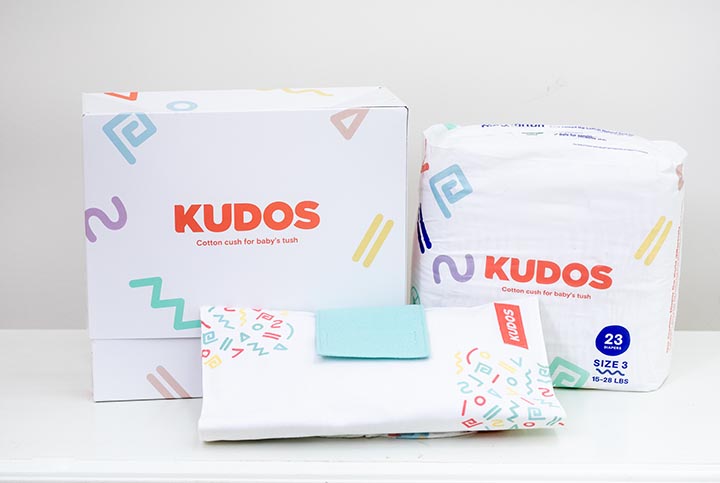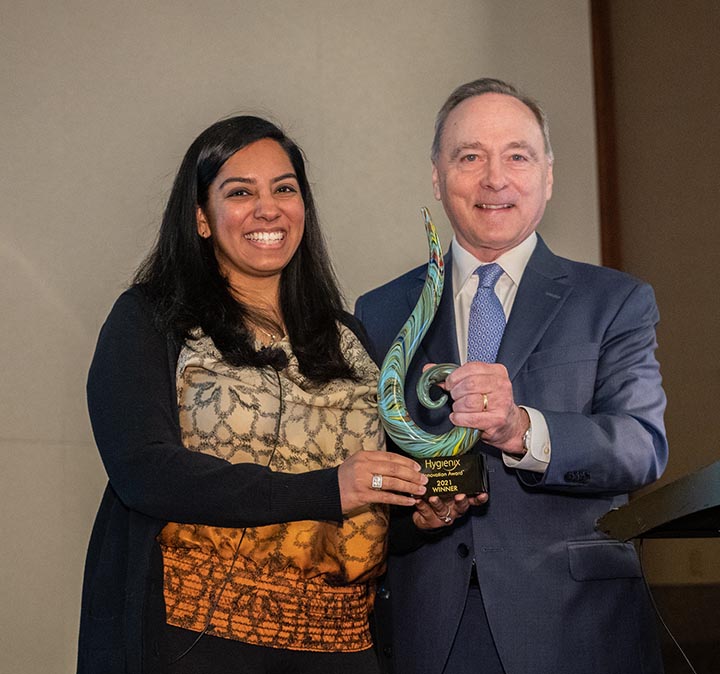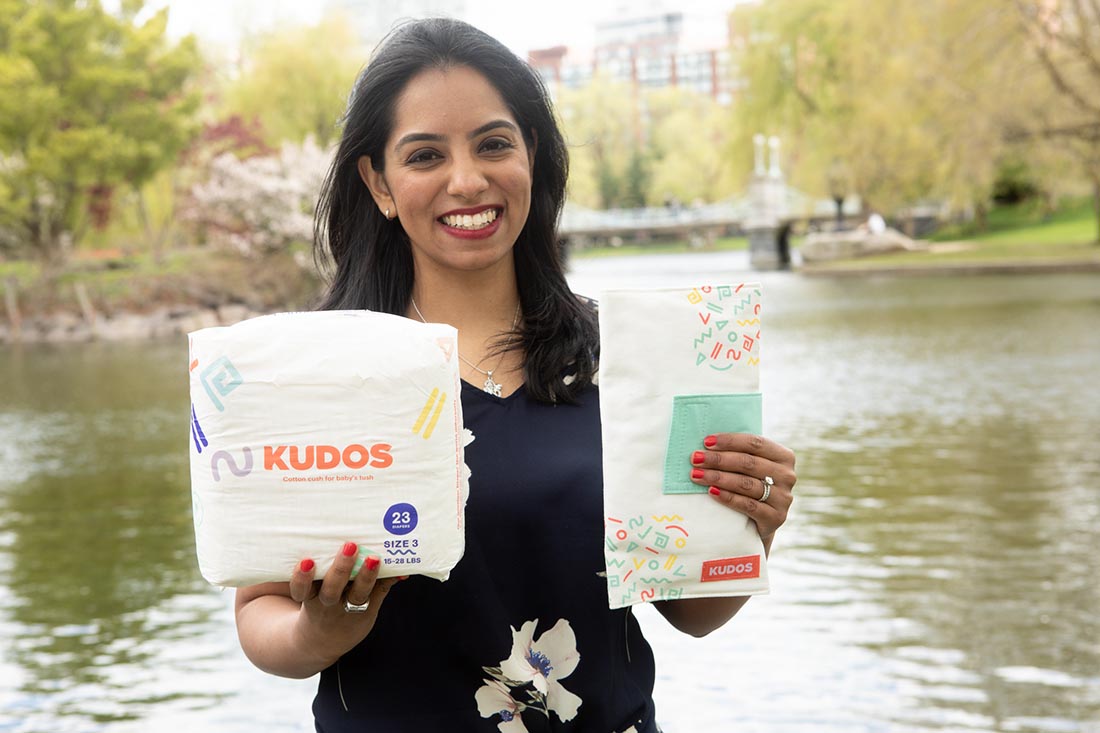Amrita Saigal, founder and CEO of Kudos is on to something. For Saigal, creating sustainable products that truly perform to the high standards of the consumer is the cornerstone of her work. Prior to founding of Kudos, a company that creates the only disposable diaper that is lined with 100% clean cotton,
Saigal was co-founder of a company that turned banana leaves into sanitary pads for schoolgirls in India. Saigal’s vision for “all things sustainable” has proven to be one that today’s consumers are gravitating toward. In 2021, Saigal accepted the INDA Hygienix Innovation Award for her company’s plant-based, earth-friendly diapers.
International Fiber Journal caught up with Saigal to learn more about her innovations and vision for a sustainable future.
International Fiber Journal: What industry or consumer problem were you hoping to resolve when you began your research and development?
Amrita Saigal: Kudos was born out of consumer demand for a safer disposable diaper. Based on our market and consumer research, this safety requirement had two main priorities:
- First and foremost: it is safer for a baby’s sensitive skin. Indeed, 69% of parents with kids under four years of age say that finding baby products that are natural and free of synthetics is extremely important to them. Unfortunately, with pretty much all disposable diapers before Kudos, baby’s skin is touching 100% plastic all day and all night, which can contain harmful chemicals that can be absorbed into the skin and disrupt endocrine and reproductive systems. With babies sitting in diapers pretty much 24/7 for the first 2.5 years of their lives, what’s touching their sensitive skin matters!
- Secondly, consumers want products that are safer for the environment. About 75% of millennials cite that the environment is top of mind when making purchases. And when it comes to diapers, the environmental impact is huge with diapers making up the third largest contributor to landfill waste.
With these two priorities top of mind, we created Kudos: the only disposable diaper where baby’s sensitive skin touches 100% soft, sustainable, safe cotton all day — the #1 doctor-recommended material for rash and eczema.

IFJ: What challenges did you have to overcome to bring the product to its fullest potential?
Saigal: Looking back, we had two major challenges:
- On the product side, one of the biggest challenges we faced was getting cotton to actually work in the topsheet. If you were to take a diaper and put cotton on it, it won’t work. That’s because cotton’s natural absorbency can be a double-edged sword. On the one hand it soaks up moisture fast, but on the other hand you need to figure out how to get that moisture out of the cotton and into the core of the diaper. That’s where our patent pending DoubleDry tech comes in. It has thousands of funnels built in to funnel moisture away from baby’s bum and alongside the length of the diaper and into the core of the diaper so that baby’s skin can stay dry when the core is wet.
- On the consumer side we also faced a challenge going up against the prevalent greenwashing and general lack of understanding of what’s currently in diapers. Because diapers are engineered to feel so soft, consumers don’t realize that the majority of their diaper – especially when it comes to what’s touching baby’s skin – is plastic. To this end, Kudos invested a lot of time and effort in educational content and materials to help better inform consumers as to how Kudos is truly different.
IFJ: How long was your R&D and trial product phase? What does the production phase entail? How did you test your marketplace on the efficiency or performance of the product?
Saigal: We spent 2.5 years in R&D, focusing on: 1) getting as many plastic-based materials out of the disposable diaper as possible, and as many plant-based materials in; and 2) engineering for optimal performance. Consumer testing was also a key part of our process. We started by testing four different configurations of diapers and had over 50 babies test them. We then narrowed down to our preferred option with the cotton topsheet and started refining that configuration in order to get the absolute best performance. We proceeded to do two more rounds of trial manufacturing runs and trials with another 50+ consumers. We also conducted multiple rounds of third-party lab testing to ensure the best performance metrics.

IFJ: What materials were you working to incorporate into the product – what worked and what did not?
Saigal: So, I always knew I wanted to get as much plastic out of the diaper and as many plants in. But cotton wasn’t the only option we considered at first and I like to say we didn’t decide on cotton, it was our consumers who made the choice for us.
One thing we never wanted to use was bamboo, which might be a surprise since it’s become very popular in baby products. Unfortunately, it has been shown that the harsh processing to turn hard bamboo into soft fabric releases environmentally toxic carbon disulfide (which can cause psychosis and lung disease) and hydrogen sulfide into the air (which can cause reproductive issues and eye irritation).
Ultimately, we made two different types of diapers: one sourced from sugarcane fiber and one from cotton. Right away the feedback we started getting from the cotton diaper users was that not only was our diaper not leading to any redness and diaper rash for many parents, it was actually, in some instances, helping clear existing diaper rash. That’s when we knew we were onto something. Then we started really looking into cotton and, aside from the technical challenges it posed, it became a real no-brainer.
Diapers are just the start. We just launched wipes, and we’ll be launching training pants next year. Then the plan is to take our proprietary DoubleDry technology to expand into the $12 billion-dollar adult diaper market.
IFJ: What is the plan for your company to roll out this innovation to its intended marketplace?
Saigal: To date, we’ve been focused on building credibility, awareness, and community. Our diapers are available for purchase on our website, and we have an amazing consumer base of families who really care about non-toxic living and have become our biggest brand ambassadors. We’ve also gotten a lot of great coverage in the media – including a recent honorable mention in Fast Company’s 2022 Design by Innovation Awards. As we continue to scale, we’ll be looking to engage our community even more, while also expanding into new online and retail channels and geographic markets.
IFJ: What is the next step for your innovation?
Saigal: Our goal is to become the #1 eco-friendly consumer absorbents company in the world – eliminating as much plastic from these products as possible. Diapers are just the start. We just launched wipes, and we’ll be launching training pants next year. Then the plan is to take our proprietary DoubleDry technology to expand into the $12 billion-dollar adult diaper market.
IFJ: What are the conditions of the general marketplace you are in, and how do you see that changing in the next five years?
Saigal: More and more millennials are becoming parents every day. These parents are demanding baby products that are safer for baby’s skin and safer for the planet. With their current diapering options falling short, Kudos has been able to fill a real gap in the market and we have very quickly become embraced and celebrated as one of the safest disposable diapers on the market. Compared to the 6% growth we are seeing year over year for traditional disposable diapers, the growth for demand of natural disposable diapers is 11%. We expect these trends to only grow.
Furthermore, diapers are currently not a regulated industry in the U.S. but this could change. The EU recently passed a ban on single-use plastics that is going to apply to baby wipes – and potentially diapers in the future. This is creating a whole new set of incentives for innovation for diaper parts and materials, which Kudos is very excited about!


